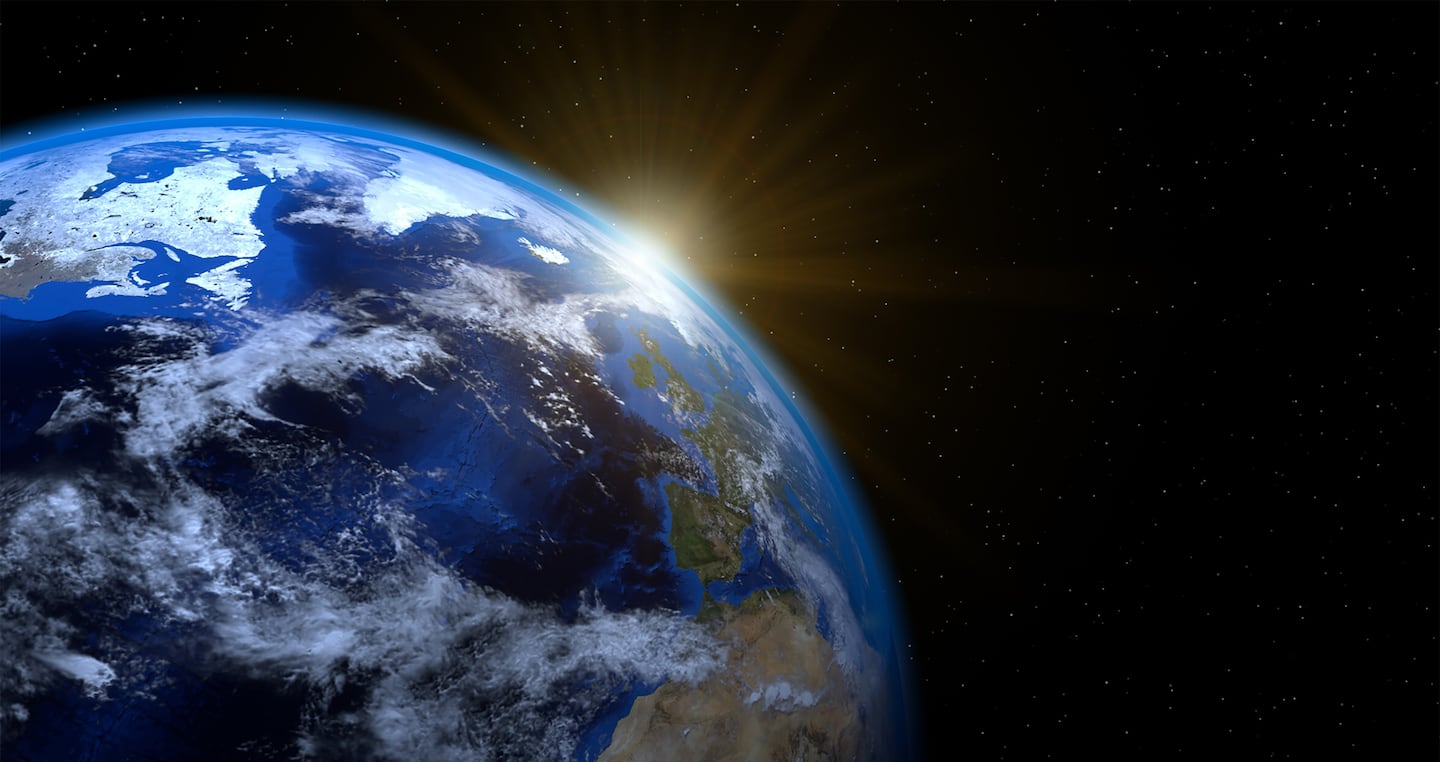This year has been chocker block with some amazing moments, but some weren’t always necessarily in Aotearoa.
Some of the news in 2024 was brought from other parts of the globe, so if you’re staying in Aotearoa this holiday season, Te Ao Māori News is bringing the world to you and showing you what our Māori whānau have gotten up to across the world.
Australia
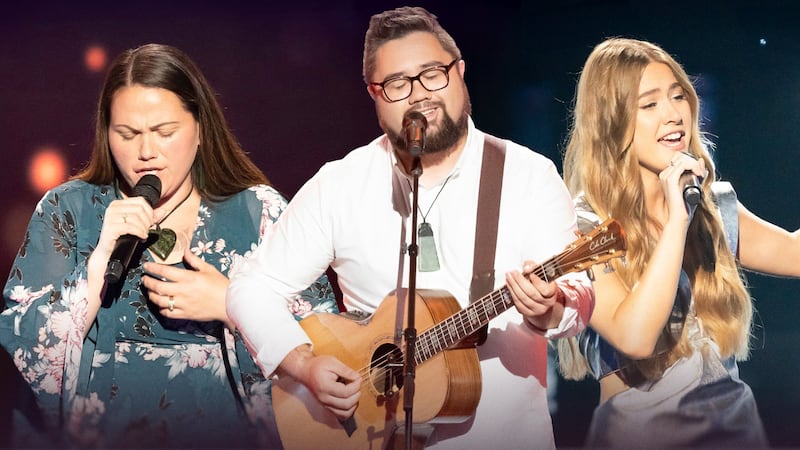
Across the ditch over in Aus, the Voice Australia had some stiff competition but it was three Māori who stood out after making it to the semi-finals.
Jaedyn Randell (Waikato), Jaydin Shingleton (Ngāi Tahu), and Letitia Butler (Ngāpuhi).
Out of the three, Randell was the only one to make the finale.
Speaking to Te Ao Māori News, the singer said she couldn’t find the words to express how she felt.
“The only one I can think of is surreal. I’m so grateful and it’s so much like a pinch-me moment. I think going on to the show, getting through the blind audition, that felt like success to me already.”
Unfortunately, Randell didn’t bring home the trophy but she is already successful in her acting career, as she is the voice of Moana in both of the reo Māori dubbed versions and also Princess Anna in Frozen Reo Māori.
Hawai’i
Speaking of Disney’s Moana, a Hawai’i-based artist Sam Mangakahia brought the demi-god Maui’s hook from the movie into real life.
Mangakahia (Ngāti Huarere, Ngāti Maru) almost thought he was being conned when Disney commissioned him to create the hook which weighs 20kgs and is over a metre tall.
Up against an already tight timeline, Mangakahia still delivered the goods - a full-sized interpretation of Maui’s magical hook for Disney’s highly anticipated Moana 2.
He said it was not just about crafting a prop but also telling a story.
“I try to keep it as simple as possible,” he said.
Mangakahia infused key elements of Maui’s mythology into the design. “I included clouds, stars, and the sun, with Maui holding a coconut harnessing its power,” he explained. “The jawbone of his grandmother is there too, all tied into a story that honours Maui’s mythology.”
Cook Islands
Earlier this year the late Kiingi Tuheitia Pōtatau Te Wherowhero VII and the Kaumaiti Nui Travel Tou Ariki of the Cook Islands to endorse He Whakaputanga Moana with other Māori leaders.
This declaration was to give legal recognition to whales as persons with inherent rights.
“The songs of our ancestor, the tohorā (whale), who have navigated these very waters for generations, grow fainter.
“He Whakaputanga Moana is not merely words on paper. It’s a Hinemoana Halo, a woven cloak of protection for our taonga, our treasures – the magnificent whales.”
“Ultimately, He Whakaputanga Moana is a declaration for future generations. Our mokopuna (descendants) deserve to inherit an ocean teeming with life, where the songs of whales continue to resonate across the vast expanse,” Kiingi Tuheitia said.
The Māori king and many other Pacific leaders signed the declartion.
He Whakaputanga Moana aims to establish marine protected areas and implement dynamic rāhui (customary restrictions guided by ancestral wisdom) are crucial steps. The declaration also advocates for weaving together mātauranga Māori (Indigenous knowledge) with science for a more holistic approach to whale protection. The declaration emphasises the crucial role of Polynesian communities and fosters regional collaboration for whale conservation.
After his death residents of the Tonga island group of Vava’u promised to honour the late Māori king’s call for whales to be given personhood.
Vava’u is one of the few places in the world where tourists can swim with whales.
Taiwan
Hoping over to the continent of Asia, two rangatahi siblings, Kahuao and Aorangi Hall are both attending school in Taiwan and, despite missing home, have found ways to ensure being Māori is still the way they treat everyday life.
The two younger sons of New Zealand’s trade commissioner in Taiwan, Tina Wilson, moved to Taiwan in 2020.
The brothers, who are descendants of Ngāti Tūwharetoa and Ngāti Tūkorehe, were raised in Taupō immersed in their culture.
This year, Kahuao was invited to teach Taiwanese children the ways of Māori and later a kapa haka was invited to showcase the entertaining works of Tānerore and Hineteiwaiwa.
“We had Ngāti Whakaue come in and perform at assembly. The songs just blew them away, a whole bunch of Taiwanese kids doing toia mai. It was pretty mean.”
The boys also say there are advantages to being Māori overseas.
“People think you’re cool or unique because you’re Māori,” Aorangi said.
Kahuao said, “I feel we have a very different perspective from others, coming from more of an open area, where as everyone here is contained. Even talking to my classmates, they always think about how to make things more efficient to make things better instead of how to make people happier.”
Japan
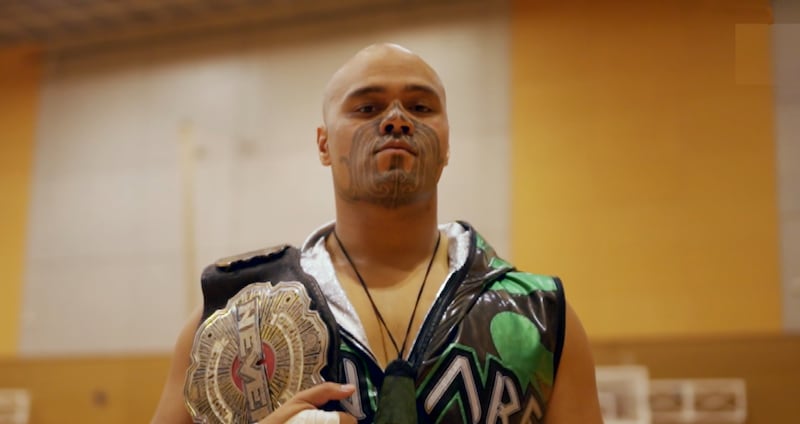
Moving north to Japan, Te Ao with Moana reporter Jess Tyson investigated if tā moko, mataora and moko kauae were taboo in Japan.
Tattoos in Japan are not illegal. But traditionally, attitudes are more conservative, and while some view tattoos as an art form, the Japanese government, on the other hand, does not.
Although they have long been banned in public onsen, hot springs, and bathhouses, but in the bigger cities, exceptions are being made.
Professional wrestler, Aaron Henare (Ngāpuhi, Ngāi Takoto, Te Arawa, Ngāti Kuri), is signed to New Japan Pro-Wrestling under the ring name Henare.
He’s been living in Japan for eight years and wears his mataora proudly. He said the reaction to the taonga has been nothing but positive.
“There’s been no problems on the street. There’s been no problems going anywhere. In the gym, I wear a mask because I respect their tikanga. I don’t wanna scare anyone if [I’m] pumping weights in the gym. As long as it’s respectful they’re all right and the fans love it. They’re like, ’Wow, I can’t believe he loves his people so much that he is willing to do that.’ It’s like a different level of respect they have.”
Henare said he doesn’t believe he is breaking Japanese tikanga with Māori tikanga by wearing mataora.
Read more of Jess Tyson’s investigation here.
Thailand
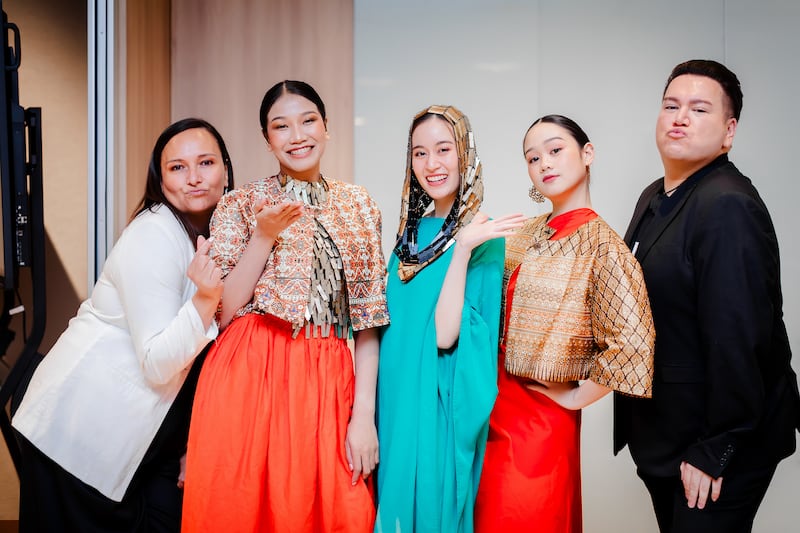
Going to Thailand, two Māori-owned fashion labels, KaistorSt and Mitchell Vincent Collection, took a major step into the Thai fashion market after launching their newest collections in Bangkok.
In October they held a fashion showcase named AHO: Continuity and Connection to launch the collections that weave together Māori culture and Thai heritage.
KaistorSt owner Nichola Te Kiri, said the feedback from guests had been nothing but positive.
“Everyone’s loving it. They actually really love our culture. The other feedback I heard is that they want to have it again… I feel really content that they understood it, understood the narrative, understood and could see that connection.”
Te Kiri’s label KaistorSt redefines fashion and accessories with a mission rooted in te ao Māori. She is passionate about narrating Indigenous stories through limited-edition clothing and bespoke pieces and weaves pūrākau (stories) into every creation.
Mitchell Vincent Collection designs are inspired by stories handed down through generations and designed with colours that evoke sophistication, using ethically sourced and dead-stock end-of-line fabrics. Each collection at the event also wove together Māori heritage and Thai culture.
“[Guests are] really connected with our culture, but also, I think they were just surprised to be able to see fashion coming from Aotearoa. So it was quite a cool spin being able to put culture and fashion together and at the end of the day that’s what myself and Nichola do,” said Vincent.
China
Haka performers from Angitu and Te Iti Kahurangi in September were in Shanghai representing Te Matatini and Aotearoa at the Chinese Tourism Festival.
Unfortunately while in the country, Typhoon Bebinca was hitting the country during the same time
Angitu performer Blake Ihimaera, was with the travelling group. She said that while the kaihaka were in good spirits, they were on tenterhooks bracing for full impact.
“E noho here ana mātou i ngā hōtera. Kei te pai te wairua, engari i tō mātou kitenga atu i te anipā o te hunga noho ki konei, e tika ana me mataara hoki mātou.”
“We’ve been told to stay in our accommodation and not to leave. Spirits are high but to see the concern on locals’ faces, we’re also very aware of the impact the typhoon has,” she said.
Before the teams knew it, the performance was cancelled, but fortunately, the trip wasn’t a waste and the two kaihaka ended up being able to perform at the festival.
On an Instagram post, Angitu wrote: “What an absolutely amazing feeling being over here with our [Te Iti Kahurangi] whānau ✨
“SO GRATEFUL FOR [Te Matatini] who are the reason we are here and able to share our culture with the world 🥺"
France
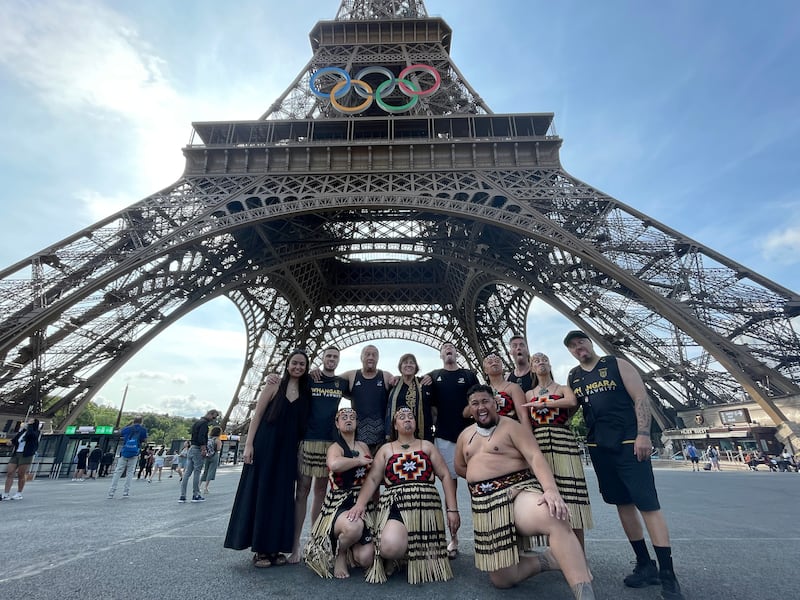
During the 2024 Summer Olympics, haka group Whāngārā Mai Tawhiti captured global attention when they performed at the Eiffel Tower in Paris.
Sir Derek Lardelli, world-renowned artist and All Blacks haka composer, said he hopes the performance sends a message not only to the world but to New Zealand as well.
”I look back at the words of our late aunty, Ngoi Pēwhairangi, who once said this when it came to the Māori language - Whiua ki te ao. Whiua ki te rangi. Whiua ki ngā iwi katoa. Present to the world. Present to the heavens. Present to the nation!
“Thus, here we are, [as Whāngārā Mai Tawhiti] presenting Māori purpose and aspirations to the world, proving Māori can make their mark in the world.”
Tourists and locals alike gathered to witness their performance.
In bringing the haka to the Olympics, Whāngārā Mai Tawhiti not only entertained but also educated the world on the point of difference that New Zealand has compared to the rest of the competing countries.
Lardelli said despite the challenges faced in merely performing under the Eiffel Tower, today’s performance captivated the masses and served as a reminder of the strength and resilience of indigenous communities across the globe.
“We are the indigenous people of New Zealand who are responsible in carrying the sanctity of not only our New Zealand athletes and Māori King, but of Aotearoa as well.”
During the time at the Olympics, Aotearoa snatched ten golds, three of which came from Lisa Carrington and her team and one from the Black Ferns.
England
In England, one of New Zealand’s Labour MPs was making history in the Oxford University debate.
Willie Jackson was the first Māori person to be invited to the oldest university in Britain to take part in the debate. The moot was whether British museums were British, with Jackson having argued they were.
Of course, he did end up taking the win for his team, telling the audience only the British had the “audacity’ to take from Indigenous people and call it theirs.
“British museums are very, very British because it’s very, very, very British to take from indigenous people and never hand it back.
“Who else has the audacity to arrive on distant shores, hop off their boats and declare they own everything. The British, that’s who.
“The entire cultural history of the British is stealing good ideas and culture from everyone they encountered,” Jackson said.
After being declared the winner, Willie Jackson sad: “It was just a magnificent response. You know, I was really humbled by the response, you know, young Kiwis and just about all Pākehā coming over here. There were 10 or 15 of them here coming over to give me a hug afterwards.
“It was very humbling and lovely to see. I just hope that people were proud.”
United States of America
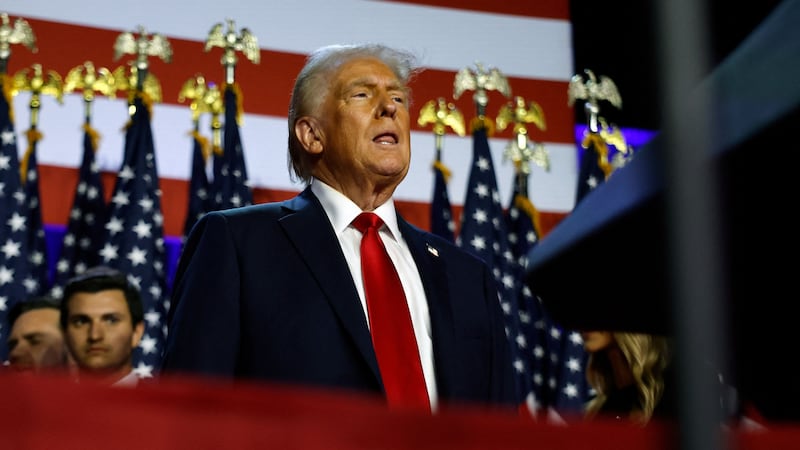
This year was a big year for the American people as they had a history-making election between Donald Trump and Kamala Harris.
Trump ultimately won the seat again becoming the first convicted criminal to become President.
The day after the election, commentator Shane Te Pou was in front of the White House in Washington D.C.
Talking to Te Ao Māori News he said he could feel everyone was on edge.
“The vibe is intense, security is high, and I‘m on what they call the South lawn, it‘s only because the main entrance or the main fence line has been boarded off. So you can see it‘s intense, it‘s high and I’ve walked passed hotels and they‘ve started to border up, it‘s a city, it’s a country on edge.”
And for other Māori living under the same roof unable to vote, they agree tensions are high.
Moana Moleni (Ngāpuhi, Ngāti Porou) a high school teacher said “In my classroom today, I had students fighting in class on who they were supporting and that would’ve come forward from the home. So there’s a lot of anxiety and there’s a lot of differences within different states and different households and even families, to the point that families are actually fighting over it.”
She added she has been a Trump supporter since living in the United States for over 7 years.
“With Trump being the better choice, it’s probably because he’s got economic policies in place that have been successful and he’s proven himself before.”
For Pauline Stokes (Te Rarawa, Ngati Whatua, Ngati Wai, Te Aupouri) this will be the second election she has seen, and has lived across three red states in Missouri, Tennesse and now Utah, however, she supports Kamala Harris’s policies.
“She (Harris) wants to have more of a sustainable environment over here as well as healthcare. I’ve always been a strong advocate for free healthcare,” said Stokes.

